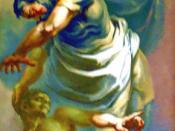The concept that moral actions are those that conform to God's will is within the context of the Divine Command Theory. This theory explores whether an action is right or wrong by determining whether or not an action conforms to God's will. If an action does conform then it is morally permissible, if it does not then it is impermissible. This theory is shattered, however, when the will of God is scrutinized by Socrates in a dialogue with Euthyphro at the entrance of the law courts.
Socrates was prompted to inquire into the spirit of piety and his very moral fiber after a politician named Meletus charged him with corrupting the young with his impiety. Euthyphro's dilemma surrounds Socrates' discussion regarding the definition of piety. Euthyphro believes that his actions are pious and Socrates challenges him to define holy and unholy. Euthyphro responds that what he is now doing is holy - prosecuting a wrongdoer (his own father) of murder.
Socrates reasons that Euthyphro is prosecuting his father because the person killed must have been a relative. He seems to think that it makes a difference whether or not the victim was a member of the family, but Euthyphro points out that the real matter is whether or not it was right for his father to commit murder.
Socrates, interested in Euthyphro's knowledge of all things divine, wishes to become Euthyphro's student so that he can challenge Meletus before the trial. He asks Euthyphro to prove what piousness is using logic, but Euthyphro is unable to do so because the divine command theory doesn't stand up under Socrates' scrutiny.
Socrates points out that what is pious must be pious outside of the fact that the gods love it. If the gods love it, there is no...


